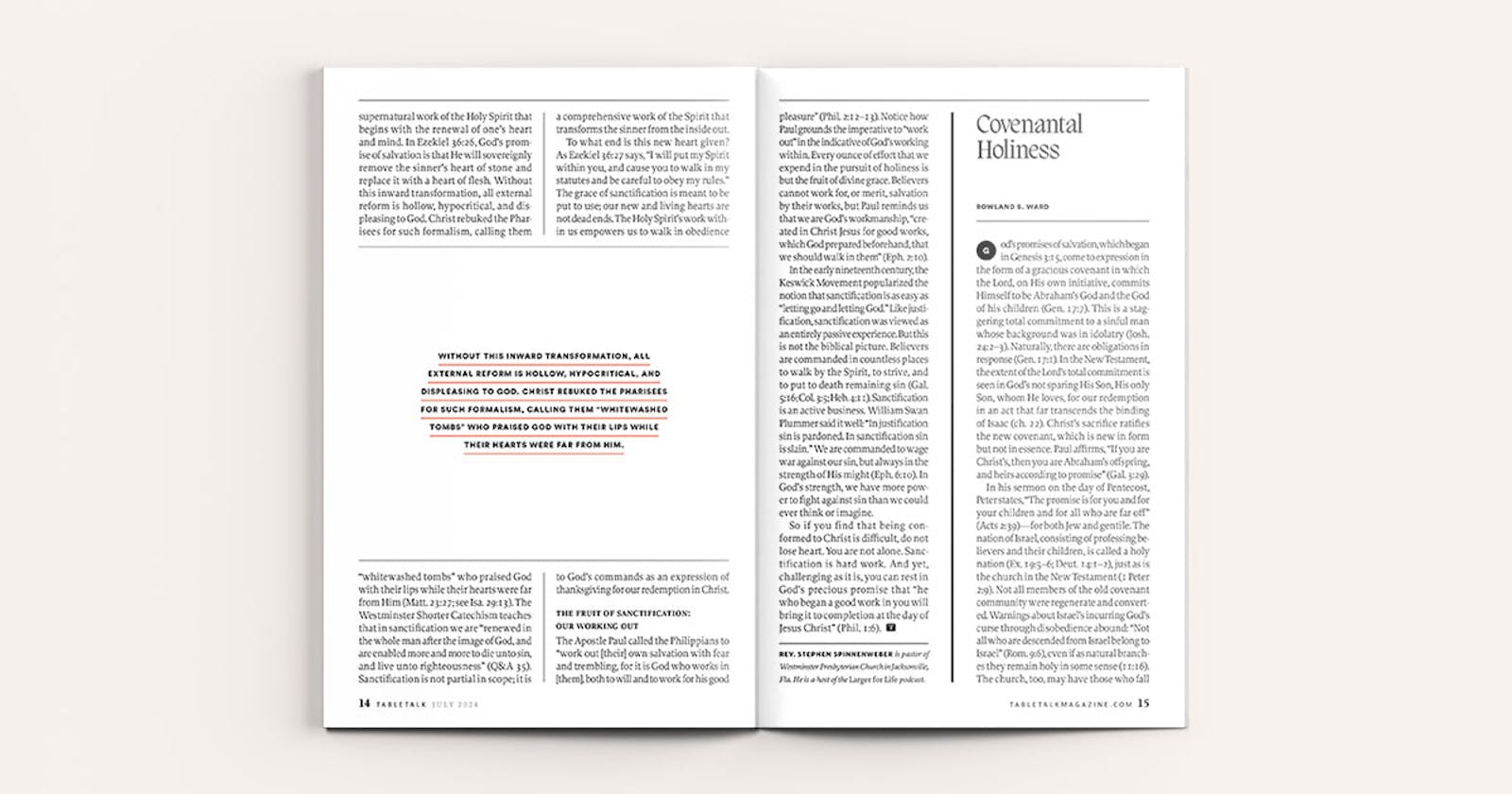
Request your free, three-month trial to Tabletalk magazine. You’ll receive the print issue monthly and gain immediate digital access to decades of archives. This trial is risk-free. No credit card required.
Try Tabletalk NowAlready receive Tabletalk magazine every month?
Verify your email address to gain unlimited access.
God’s promises of salvation, which began in Genesis 3:15, come to expression in the form of a gracious covenant in which the Lord, on His own initiative, commits Himself to be Abraham’s God and the God of his children (Gen. 17:7). This is a staggering total commitment to a sinful man whose background was in idolatry (Josh. 24:2–3). Naturally, there are obligations in response (Gen. 17:1). In the New Testament, the extent of the Lord’s total commitment is seen in God’s not sparing His Son, His only Son, whom He loves, for our redemption in an act that far transcends the binding of Isaac (ch. 22). Christ’s sacrifice ratifies the new covenant, which is new in form but not in essence. Paul affirms, “If you are Christ’s, then you are Abraham’s offspring, and heirs according to promise” (Gal. 3:29).
In his sermon on the day of Pentecost, Peter states, “The promise is for you and for your children and for all who are far off” (Acts 2:39)—for both Jew and gentile. The nation of Israel, consisting of professing believers and their children, is called a holy nation (Ex. 19:5–6; Deut. 14:1–2), just as is the church in the New Testament (1 Peter 2:9). Not all members of the old covenant community were regenerate and converted. Warnings about Israel’s incurring God’s curse through disobedience abound: “Not all who are descended from Israel belong to Israel” (Rom. 9:6), even if as natural branches they remain holy in some sense (11:16). The church, too, may have those who fall away. They were grafted in through profession of faith but are cut off by unbelief and will not enter God’s rest (Heb. 4:11).
Thus, covenantal holiness describes the relationship of being in God’s covenant family even when the aim of the relationship in a vital communion with God through Christ by the Spirit is not realized. Take a particular New Testament example in 1 Corinthians 7:12–16. When a person becomes a believer but his spouse does not, the question of the believer’s remaining in the marriage arises (v. 12). The unbelieving spouse may consent to remain in the marriage, allowing the believer to practice his new Christian faith. In this situation, the believer is not to separate or seek a divorce but is to remain married as long as the unbeliever desires to remain married (vv. 12–13). The faith of the believing spouse means that the unbelieving spouse is set apart or made holy for God’s purposes: “Otherwise your children would be unclean, but as it is, they are holy” (v. 14).
In Paul’s argument, the holiness of the believer’s children is a given in a gentile church as it was with their spiritual forefathers in Israel (1 Cor. 10:1–22). They are holy because of the covenant: “The promise is for you and for your children” (Acts 2:39). The position of the unbeliever necessarily follows. God is against sin but not against the family. He does not needlessly disrupt the family in a mixed-faith marriage. Although not converted, the unbelieving spouse is not in the same sphere of impurity as before his or her spouse’s conversion. Each day, he or she is confronted with the promise of God’s covenant in the life of the godly spouse and called to enter it fully.

On the other hand, an unbelieving spouse may despise and mock the Christian gospel and refuse to continue in the marriage. It happened then, and it happens today. If the unbeliever departs and seeks divorce, the believer is not bound to maintain the marriage at any cost by abandoning allegiance to Jesus Christ; the believer is not enslaved by the unbeliever’s act so that he or she can never marry again (1 Cor. 7:15). God calls His people to peace. Staying with a hostile unbeliever in the hope of conversion may not be appropriate (v. 16), but when it is, the principles of 1 Peter 3:1–7 apply.
Paul is not directly addressing the baptism of covenant children, nor does the case law he gives resolve all questions, since individual circumstances are so variable. But we can certainly say that preaching in the covenant community needs to challenge presumption and include the obligation of appropriate response to God’s covenant kindness, as Hebrews 3:7–19 exhorts. The accountability of Israel at Sinai, and the ministry of angels there, is stressed in Hebrews 2:2, with disobedience receiving its just reward. How much more are we accountable if the revelation that God has given in His eternal and exalted Son is disregarded? How shall we escape if we neglect so great a salvation and fail to appropriate Christ in truth?
